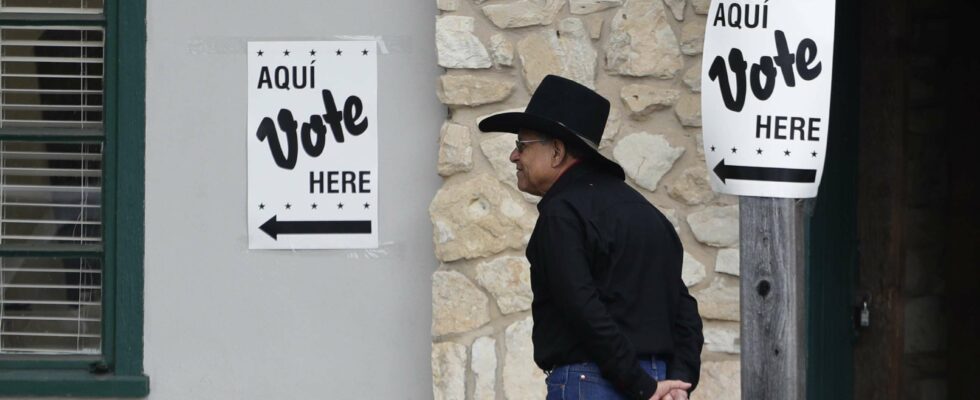Après que Porto Rico ait été qualifié de «école flottante de déchets» lors d’un discours de Donald Trump, un groupe communautaire latino prévoit une hausse de la participation des électeurs latinos dans les États clés. Ana Valdez, CEO de la Latino Donor Collaborative, déclare que ces commentaires outragent et motivent une mobilisation accrue dans des États comme l’Arizona, le Nevada et la Floride, où les électeurs latinos constituent des proportions significatives, et où la population latino a crû de 6 à 11 % entre 2020 et 2023.
According to a Latino community organization, a surge in Latino voter turnout in key swing states is expected following Donald Trump’s derogatory remarks about Puerto Rico at his Madison Square Garden rally, where he referred to it as « a floating island of garbage. »
Ana Valdez, CEO of the Latino Donor Collaborative (LDC), a nonprofit dedicated to changing perceptions of Latinos in the U.S., expressed her outrage. « I am appalled that comments like these continue to target the Latino community, » she stated. « We anticipate that remarks made this weekend will encourage even greater turnout in states with significant Latino populations, such as Arizona, Nevada, and Florida. »
LDC’s 2024 Latino voter report indicates that Latino voters could play a crucial role in determining the outcomes in five of the seven swing states.
They highlighted the notable Latino presence in Arizona and Nevada, where registered Latino voters constitute 27 percent and 21 percent of the electorate, respectively.
From 2020 to 2023, the Latino population in swing states—Arizona, Nevada, Georgia, North Carolina, Pennsylvania, Wisconsin, and Michigan—grew by 6 to 11 percent, according to LDC data.
These states hold significant influence in the upcoming presidential election, with current polls indicating a very competitive race.
The LDC pointed out that historically, both major political parties have neglected Latino outreach, assuming that Latino populations are primarily located in « noncompetitive » states.
The importance of Latino voters is illustrated through California’s example, as noted in the book Latino America: How America’s Most Dynamic Population Is Poised to Transform the Politics of the Nation by political scientists Matt A. Barreto and Gary M. Segura. The authors argue that California’s Latino population has been key in preventing the state from becoming a swing state.
California was previously considered a red state from 1952 to 1988, with Lyndon B. Johnson being the only Democratic candidate to win the state during that time.
Many attribute California’s shift from red to blue to the enactment of Proposition 187 in 1994, a ballot initiative designed to limit undocumented migrants’ access to public services. Although it was declared unconstitutional in 1999, its long-lasting effects are evident. Following 1994, Hispanic voter registration heavily leaned toward the Democratic Party, as noted by The Cato Institute.
A 2016 study from the University of California, authored by political scientist Hovannes Abramyan, was cited by the libertarian think tank, revealing that « Hispanics hold more conservative views than their predominant self-identification as Democrats might suggest. »
Researchers noted, « Hispanics lean Democratic because they perceive this party as more supportive of liberalized immigration policies, while the Republican Party is often seen as opposed to such approaches. Therefore, to engage Hispanic voters, the GOP must soften its immigration stance. »
Valdez continued, stating, « For years, politicians have underestimated the Latino electorate by relying on outdated beliefs. This applies to both parties—Democrats often presume they can count on a majority of Latino votes, while Republicans narrowly target conservative segments. » She emphasized, « This overlooks the fact that Latinos are a diverse population that values family, hard work, and community. Our research shows that Latinos are the fastest-growing voting group in the nation and have been largely ignored by campaigns. »
Selon une organisation communautaire latino, une augmentation du taux de participation des électeurs latinos dans les États clés est attendue après les remarques désobligeantes de Donald Trump sur Porto Rico lors de son rassemblement au Madison Square Garden, où il a qualifié l’île de « flottant une île de poubelles ».
Ana Valdez, PDG de la Latino Donor Collaborative (LDC), une organisation à but non lucratif dédiée à changer la perception des Latinos aux États-Unis, a exprimé sa colère. « Je suis scandalisée que de tels commentaires continuent de cibler la communauté latino », a-t-elle déclaré. « Nous prévoyons que les remarques faites ce week-end encourageront une participation encore plus grande dans des États avec d’importantes populations latinos, comme l’Arizona, le Nevada et la Floride. »
Le rapport sur les électeurs latinos de 2024 de la LDC indique que les électeurs latinos pourraient jouer un rôle crucial dans la détermination des résultats dans cinq des sept États pivots.
Ils ont souligné la présence notable des Latinos en Arizona et au Nevada, où les électeurs latinos inscrits représentent respectivement 27 % et 21 % de l’électorat.
